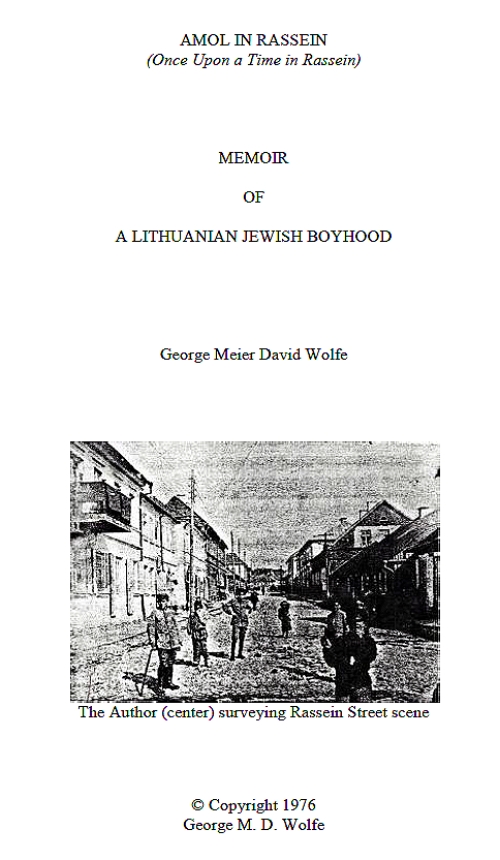|
Raseiniai Kehila |
|
Raseiniai Where once we walked |
 |
Amol in Rasein An extract from the book Amol in Rassein (Once Upon a Time in Rassein) (C) 1976 - George M. D. Wolfe. Reproduced here with permission All references to the town of Raseiniai (Yiddish) in this section of this kehila site will be called Rassein, the name used by the Author.
Extract from the Foreward "When my children were young, and it was my turn to tell them a bedtime story, I would often put aside the prowess of the "Little Engine That Could" and tell them some of my adventures in Rassein, the Lithuanian town where I was born and spent the first 15 years of my life. The idea of someday writing a memoir of that vanished period was probably born at the bedside of one of the children. But it was the urging of my grown children in recent years that persuaded me to undertake the pleasant task of engaging my memory for fun, as a small legacy, a tribute to my parents, brothers and sisters and as a memorial to members of my family, Jews and non-Jews, and countless other people who died at the hands of the Nazis in Lithuania and elsewhere. In this Memoir of my boyhood I have faithfully recorded events in which I participated or observed, as well as impressions which have left a strong imprint on my memory. Parts of the narrative which deal with matters obviously not known to me at the time, such as the history of Lithuania and Rassein, our family's antecedents and the course of World War I outside the narrow scope of my birthplace, are based on published accounts consulted in the process of writing this account, and on conversations with my sister and brothers to whom I acknowledge my deep gratitude for their encouragement and assistance. They are, however, in no way responsible for any errors of fact or omissions in this chronicle. I cannot vouch for the accuracy of certain details of a social or political nature, but thought it best to record my recollection of them in the context of my growing up in Rassein. Another way of saying it is that this is not an historical or sociological monograph, but rather a fragment of an autobiography."
"But even without the tumultuous events of the War, life in Rassein for me and other young people was only a prelude to emigration - to America in the first instance, but also to South Africa and to some extent to Palestine. Much as the East European shtetl has been romanticized in such productions as "Fiddler on the Roof" and novels, it was essentially a way station on the road to other worlds - "die golden medine" (America), Zionism, or revolutionary involvement. My 15 years in Rassein have, I believe, left a strong and lasting imprint on my life and undoubtedly influenced my choice of career, a lifelong interest in working with people and for social change in the interest of a more humane society." March 21, 1976
I have used quotation marks " to indicate contigious parts of the text so that the reader can identify where extracts, as presented here, are complete but may not be in the same sequence as in the original text. I have used "........." to indicate that a section has been omitted In some cases, names of persons who may still be living, have been excluded for privacy purposes. Alan Nathan
Navigation between the chapters:- Use the side bar, or the links below Cover : Early Memories of Rassein : Jewish Rassein Schooling : Making Matzoh : Whats in a name Household Chores : The Sabbath, Holidays and Holy Days Amusemenyt and Diversions : Trade and Commerce : Clothing
|
|
|
|
HOME
|
|
|
Compiled
by
Other Links KehilaLinks Home Page http://kehilalinks.jewishgen.org Link to JewishGen
This page is hosted at no cost to the public by JewishGen, Inc., a non-profit corporation. If it has been useful to you, or if you are moved by the effort to preserve the memory of our lost communities, your JewishGen-erosity would be deeply appreciated.
|

